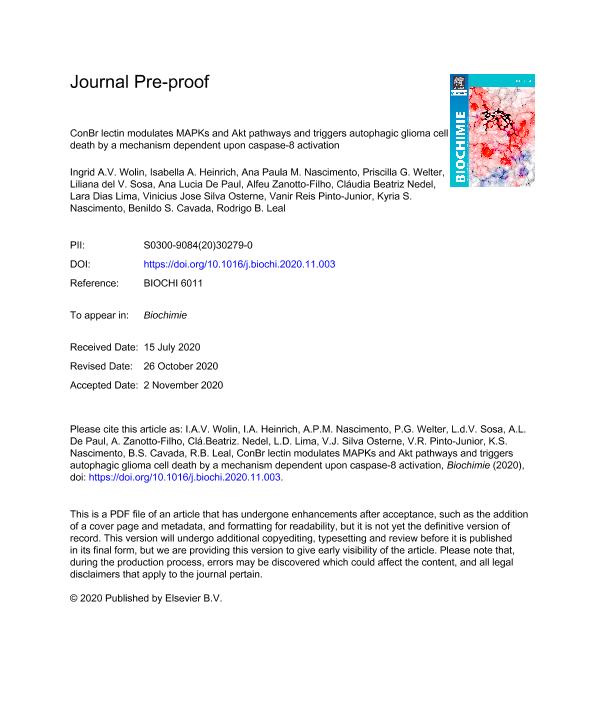Mostrar el registro sencillo del ítem
dc.contributor.author
Wolin, Ingrid A. V.
dc.contributor.author
Heinrich, Isabella A.
dc.contributor.author
Nascimento, Ana Paula M.
dc.contributor.author
Welter, Priscilla G.
dc.contributor.author
Sosa, Liliana del Valle

dc.contributor.author
de Paul, Ana Lucia

dc.contributor.author
Zanotto Filho, Alfeu
dc.contributor.author
Nedel, Cláudia Beatriz
dc.contributor.author
Lima, Lara Dias
dc.contributor.author
Osterne, Vinicius Jose Silva
dc.contributor.author
Pinto Junior, Vanir Reis
dc.contributor.author
Nascimento, Kyria S.
dc.contributor.author
Cavada, Benildo S.
dc.contributor.author
Leal, Rodrigo B.
dc.date.available
2021-08-27T20:55:54Z
dc.date.issued
2021-01
dc.identifier.citation
Wolin, Ingrid A. V.; Heinrich, Isabella A.; Nascimento, Ana Paula M.; Welter, Priscilla G.; Sosa, Liliana del Valle; et al.; ConBr lectin modulates MAPKs and Akt pathways and triggers autophagic glioma cell death by a mechanism dependent upon caspase-8 activation; Elsevier France-Editions Scientifiques Medicales Elsevier; Biochimie; 180; 1-2021; 186-204
dc.identifier.issn
0300-9084
dc.identifier.uri
http://hdl.handle.net/11336/139153
dc.description.abstract
Glioblastoma multiforme is the most aggressive type of glioma, with limited treatment and poor prognosis. Despite some advances over the last decade, validation of novel and selective antiglioma agents remains a challenge in clinical pharmacology. Prior studies have shown that leguminous lectins may exert various biological effects, including antitumor properties. Accordingly, this study aimed to evaluate the mechanisms underlying the antiglioma activity of ConBr, a lectin extracted from the Canavalia brasiliensis seeds. ConBr at lower concentrations inhibited C6 glioma cell migration while higher levels promoted cell death dependent upon carbohydrate recognition domain (CRD) structure. ConBr increased p38MAPK and JNK and decreased ERK1/2 and Akt phosphorylation. Moreover, ConBr inhibited mTORC1 phosphorylation associated with accumulation of autophagic markers, such as acidic vacuoles and LC3 cleavage. Inhibition of early steps of autophagy with 3-methyl-adenine (3-MA) partially protected whereas the later autophagy inhibitor Chloroquine (CQ) had no protective effect upon ConBr cytotoxicity. ConBr also augmented caspase-3 activation without affecting mitochondrial function. Noteworthy, the caspase-8 inhibitor IETF-fmk attenuated ConBr induced autophagy and C6 glioma cell death. Finally, ConBr did not show cytotoxicity against primary astrocytes, suggesting a selective antiglioma activity. In summary, our results indicate that ConBr requires functional CRD lectin domain to exert antiglioma activity, and its cytotoxicity is associated with MAPKs and Akt pathways modulation and autophagy- and caspase-8- dependent cell death.
dc.format
application/pdf
dc.language.iso
eng
dc.publisher
Elsevier France-Editions Scientifiques Medicales Elsevier

dc.rights
info:eu-repo/semantics/openAccess
dc.rights.uri
https://creativecommons.org/licenses/by-nc-sa/2.5/ar/
dc.subject
AKT/MTORC1
dc.subject
AUTOPHAGY
dc.subject
CELL SIGNALING
dc.subject
CONBR
dc.subject
GLIOMA
dc.subject
LECTIN
dc.subject.classification
Farmacología y Farmacia

dc.subject.classification
Medicina Básica

dc.subject.classification
CIENCIAS MÉDICAS Y DE LA SALUD

dc.title
ConBr lectin modulates MAPKs and Akt pathways and triggers autophagic glioma cell death by a mechanism dependent upon caspase-8 activation
dc.type
info:eu-repo/semantics/article
dc.type
info:ar-repo/semantics/artículo
dc.type
info:eu-repo/semantics/publishedVersion
dc.date.updated
2021-08-27T14:35:48Z
dc.journal.volume
180
dc.journal.pagination
186-204
dc.journal.pais
Francia

dc.description.fil
Fil: Wolin, Ingrid A. V.. Universidade Federal de Santa Catarina; Brasil
dc.description.fil
Fil: Heinrich, Isabella A.. Universidade Federal de Santa Catarina; Brasil
dc.description.fil
Fil: Nascimento, Ana Paula M.. Universidade Federal de Santa Catarina; Brasil
dc.description.fil
Fil: Welter, Priscilla G.. Universidade Federal de Santa Catarina; Brasil
dc.description.fil
Fil: Sosa, Liliana del Valle. Consejo Nacional de Investigaciones Científicas y Técnicas. Centro Científico Tecnológico Conicet - Córdoba. Instituto de Investigaciones en Ciencias de la Salud. Universidad Nacional de Córdoba. Instituto de Investigaciones en Ciencias de la Salud; Argentina
dc.description.fil
Fil: de Paul, Ana Lucia. Consejo Nacional de Investigaciones Científicas y Técnicas. Centro Científico Tecnológico Conicet - Córdoba. Instituto de Investigaciones en Ciencias de la Salud. Universidad Nacional de Córdoba. Instituto de Investigaciones en Ciencias de la Salud; Argentina
dc.description.fil
Fil: Zanotto Filho, Alfeu. Universidade Federal de Santa Catarina; Brasil
dc.description.fil
Fil: Nedel, Cláudia Beatriz. Universidade Federal de Santa Catarina; Brasil
dc.description.fil
Fil: Lima, Lara Dias. Universidade Estadual do Ceará; Brasil
dc.description.fil
Fil: Osterne, Vinicius Jose Silva. Universidade Estadual do Ceará; Brasil
dc.description.fil
Fil: Pinto Junior, Vanir Reis. Universidade Estadual do Ceará; Brasil
dc.description.fil
Fil: Nascimento, Kyria S.. Universidade Estadual do Ceará; Brasil
dc.description.fil
Fil: Cavada, Benildo S.. Universidade Estadual do Ceará; Brasil
dc.description.fil
Fil: Leal, Rodrigo B.. Universidade Federal de Santa Catarina; Brasil
dc.journal.title
Biochimie

dc.relation.alternativeid
info:eu-repo/semantics/altIdentifier/doi/http://dx.doi.org/10.1016/j.biochi.2020.11.003
dc.relation.alternativeid
info:eu-repo/semantics/altIdentifier/url/https://www.sciencedirect.com/science/article/abs/pii/S0300908420302790
Archivos asociados
